Present Repertoire
-
2022
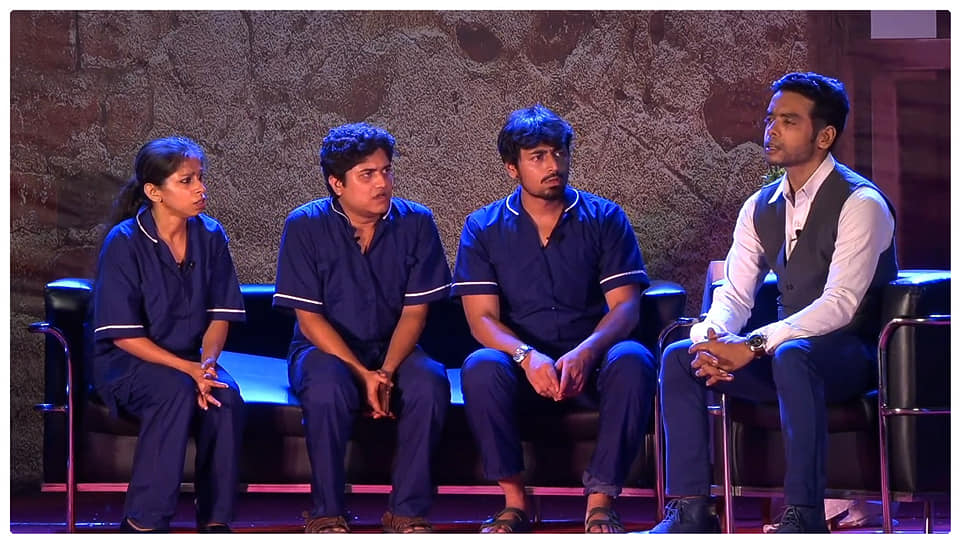
Antoron
Direction : Saptarshi Maulik
Synopsis :
Four strangers find themselves forcefully quarantined in what turns out to be an abandoned theater. Seated behind an imaginary two-way mirror, they are observed by another group of people (the audience). The allegedly contaminated strangers consider the situation. What virus are they contaminated with? What will happen to them? How and when will all this end? Little by little, we learn that this huis-clos takes place in a near future where Big Brother reigns supreme, and that the reason for this quarantine may not be entirely medically motivated.
Other Information :
CAST & CREDIT
Cast : Anindita Chakraborty, Arghya Dey Sarkar, Ayon Ghosh and Saptarshi Maulik
Drama : Arghya Dey Sarkar
Décor : Ayon Ghosh
Music : Arghya Dey Sarkar & Saptarshi Maulik
Light : Sadhan Parui
Sound : Malay SarkarChief Advisor : Sohini Sengupta
Costume & Direction : Saptarshi Maulik
Duration : 1 Hour
Premiered on 29th April, 2022 at Sister Nivedita University
-
2022
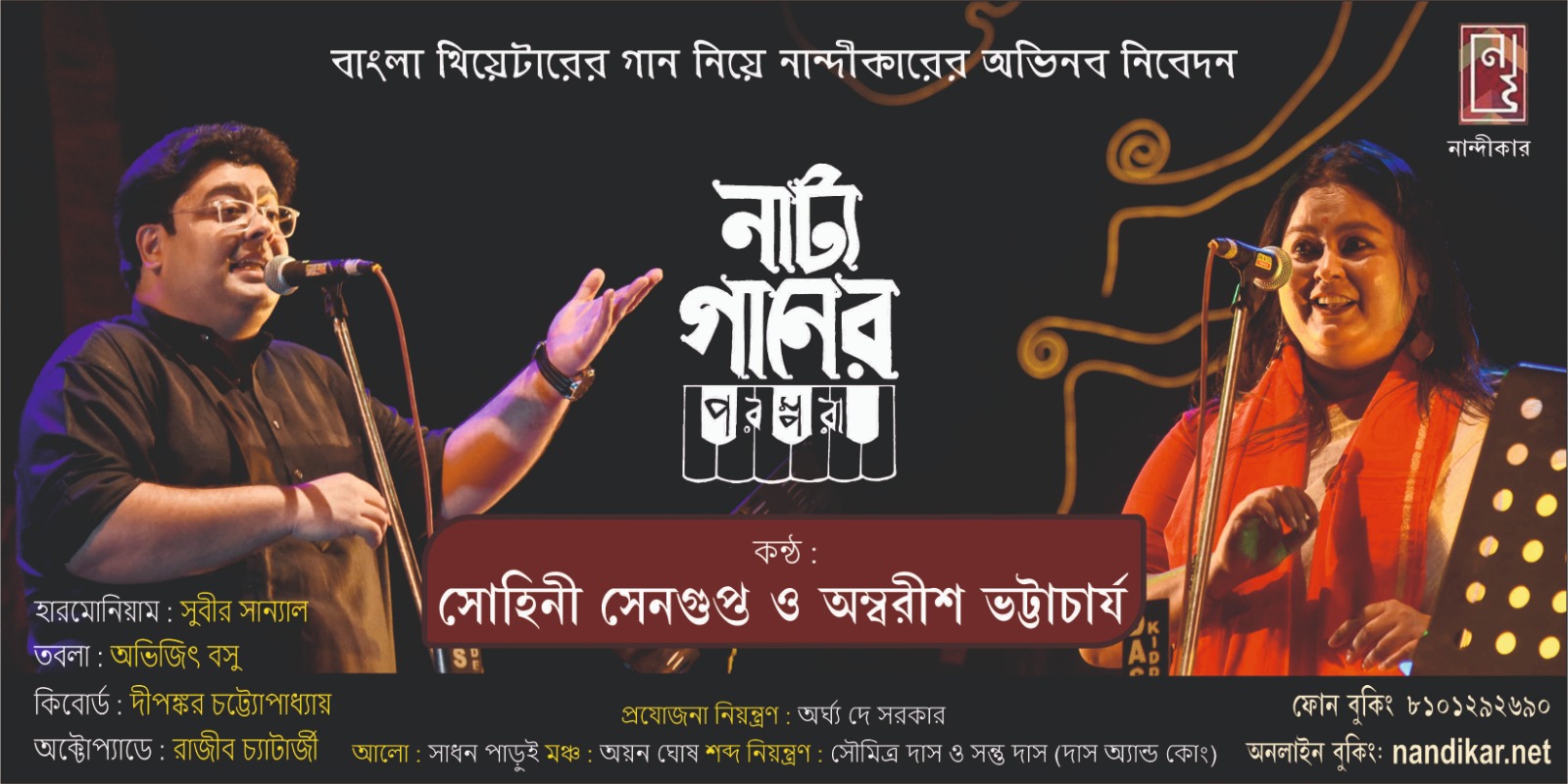
Natya Gaaner Parampara
Direction : Sohini Sengupta
Other Information : Cast: Sohini Sengupta & Ambareesh Bhattacharya
-
2022
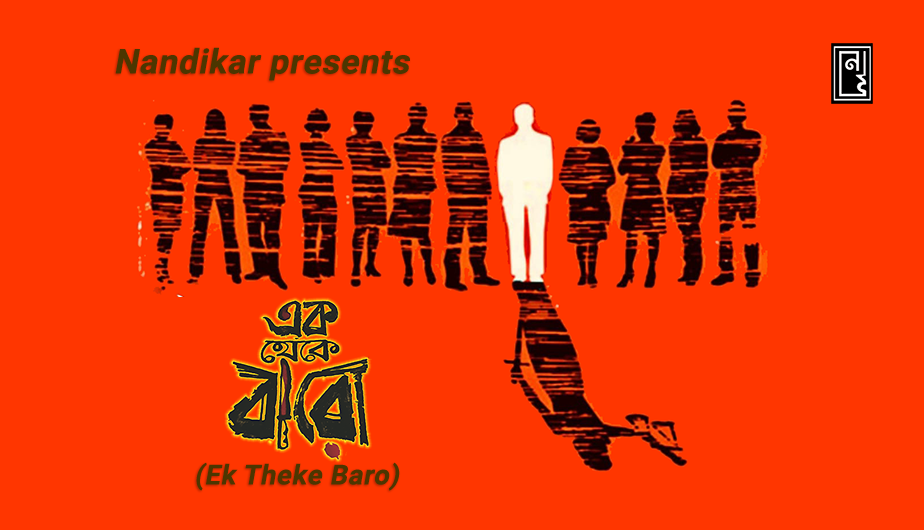
Ek Theke Baro
Direction : Saptarshi Maulik
Synopsis :
'It takes a great deal of courage to stand alone even if you believe in something very strongly.'
This is a passionate play about twelve jurors who must decide whether a boy who's charged with premeditated homicide of his father, is guilty or not.
Only one member of the jury believes there's a reasonable doubt as to the guilt of the accused, and forces the other jurors to examine the evidence more thoroughly.Against the bitter resistance of the majority, he gradually developed his arguments with logic. The debate grew increasingly violent as various facts emerged before everyone's eyes.The fierce argument that follows is a powerful warning against rash judgment and condemnation based on ignorance, prejudice or casualness and a reminder of how one courageous person can make a difference by confronting other people's opinions.Other Information :
Credits
Adaptation: Swatilekha SenguptaLight: Sadhan ParuiDecor: Ayon GhoshProduction Controller : Anindita ChakrabortyAssistant Director: Arghya Dey SarkarDirection: Saptarshi MaulikCheif Advisor: Sohini SenguptaCast
Jury 1 : Apala Banerjee / Arundhati SinhaJury 2 : Rupsha Bhattacharyya / Sumegha GhoshJury 3 : Arghya Dey SarkarJury 4 : Anindita ChakrabortyJury 5 : Diptasom DasJury 6 : Tanmoy Koley / Malay SarkarJury 7 : Sourav MukherjeeJury 8 : Saptarshi MaulikJury 9 : Barishan ChatterjeeJury 10 : Ayon GhoshJury 11 : Kuldeep PolleyJury 12 : Sourav DindaPeon : Kaushik Das -
2019
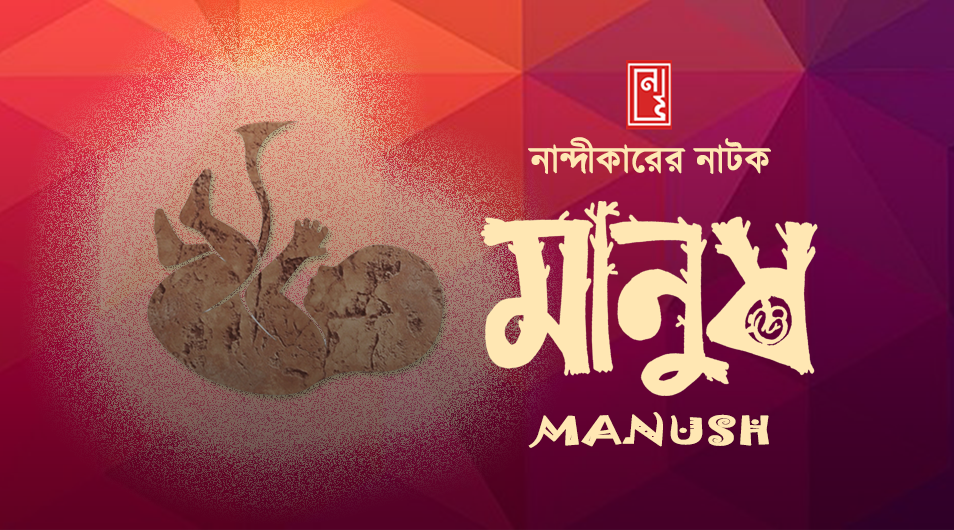
MANUSH
Direction : Sohini Sengupta
Synopsis : The central character of this Play is Bharosalal, a Hakowa by profession, assigned to kill mad dogs, bulls and other creatures. Hakowas are untouchable in our society. Once, Bharosa lost one of his eyes while trying to take a ferocious wild jackal. Still then, city's Municipality summoned him to kill a lunatic bull. Ignoring the stormy downpour, Bharosa started for Purniya town to earn his livelihood. He has to surmount a peak named Shermundi to reach to the town. Bharosalal and his four companions were trudging through the precarious path only to find a lone pregnant lady dragging herself amidst the adverse weather towards the town's hospital. They were dumbstruck! Bharosa went down his memory lane; it was also raining like cats and dogs that night and he couldn't get his wife to the hospital. And she died of labour pain. The baby couldn't survive too! Life is putting a loner into the same critical juncture again at this stage when an untouchable Hakowa decided to take care of the expecting lady for the sake of humanity. Would Bharosalal be able to invade the deep forest and overcome the perilous journey to the hospital this time? Or he would be deviated from the path of conscience and paying respect towards the solitary woman! Or else, he would reform the definition of being humane...
Other Information :
Language: Hindi & Bengali
Story: Prafulla Roy
Playwright: Anindita Chakraborty & Saptarshi Maulik
Set: Ayon Ghosh & Debabrata Maity
Music: Gautam Ghoshal
Light: Sadhan Parui
Choreography: Debkumar Pal
Make-up: Maloy DasChief Advisors: Rudraprasad Sengupta & Swatilekha Sengupta
Costume & Direction: Sohini Sengupta
-
2019

Prithibi Rasta Shabdo
Direction : Rudraprasad Sengupta
Synopsis : The story starts with a pregnant lady taking her dying husband to the hospital by pulling a rickshaw on her own. But the hospital refuses to treat him and finally, he dies. The pregnant lady cremates her husband and takes shelter on the footpath. The night guards of the city rape her repeatedly and one night she bites their sex organs! After a few days, Rabi, a rickshaw-puller, hears a baby weeping in a pile of garbage. He adopts the abandoned baby and names her Pari. He has now found a motive to live... in bringing up Pari.
Time passes. Now, Pari is a mother but she surrenders her little son, Bodhisotwo, to Rabi's custody and disappears. Rabi raises Bodhisotwo and leaves behind him a stable along with poor pets - an unfledged parrot, a lame cat, etc. Will Bodhisotwo's life maintain an undisturbed flow with these pets? Will the roads of our city allow him to grow up as its citizen? Will he be able to live alone...?Other Information :
Script: Saptarshi Maulik
Music: Souvik Bhattacharjee
Light: Sadhan Parui
Direction: Rudraprasad Sengupta
Associate Director: Sohini Sengupta
Special Thanks to Rabindranath Tagore and Late Bikram Singh -
2018
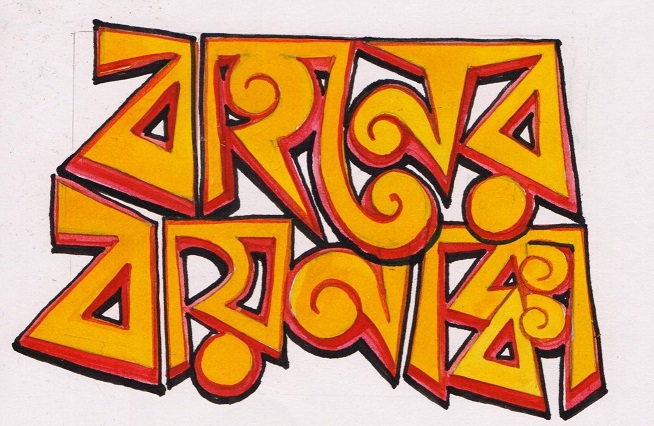
BAHONER BAYNAKKA
Direction : Arghya Dey Sarkar
Synopsis :
Maa Durga leads her family life with prosperity at Kailash but this Play is all about the other members of her extended family. They are obedient companions of Gods i.e. Lion, Mouse, Owl, Peacock, Swan, etc. Poor Ganesh can never understand who is stealing his hidden foodstuffs; suddenly the Mouse offers a share of that stolen snacks and Ganesh, in no time, identifies the black hat. Ganesh decided to keep the Mouse as his obedient companion so that united they could taste all delicacies secretly. On the other side, Kartick is amazed to see an Eagle (Garuda) and a Peacock fighting fiercely. It would be of great help if Kartick could get such a warrior like Peacock as his obedient companion. This Peacock would wake Kartick up every morning. But here in arises Lakshmi’s problem. The Mouse is allegedly damaging her boxed up ten-year old clothes. Chaos is looming over Kailash. Now who will save Lakshmi’s belongings from the mischievous Mouse! Again, Saraswati has her concern as well. Every other day her quill breaks off! Where from she will get innumerable quills and hand writing seems illegible if written with a broken quill. Are Lakshmi and Saraswati going to find obedient companions as their helping hands like Ganesh and Kartick found?
At this point, Maa Durga is also facing troubles. Kartick is neglecting studies and Ganesh is becoming an eternal eater. But Maa Durga really cannot manage her daily jobs; Unlike Bengal’s richness of six seasons, Kailash only has unending winter! Mahadev never looks after anything and lives on his uprising whims. In the meantime, Narad gifted a Lion Cub to Mahadev. The minor is very idle and don’t pay any heed to Maa Durga! Now the question is who will stand beside Maa Durga when Buffalo (Mahish) will vandalize agricultural fields? How will Maa Durga transform herself into Mahishmardini (destroyer of Mahishasur, the Buffalo-Demon) without her obedient companion the Lion King!Other Information :
STORY: DIPANWITA ROY
DRAMA : ARGHYA DEY SARKAR
SET: DEBABRATA MAITY
LIGHT: ARGHYA DEY SARKAR
MUSIC: SOUVICK BHATTACHARJEE
PROPS: MALAY SARKAR
DIRECTION : ARGHYA DEY SARKAR -
2018

MRITYUNJOY
Direction : Sohini Sengupta
Synopsis :
Mrityunjoy, a young boy, has deep, nuanced feelings and emotions. But he lacks the means to express them. He has cerebral palsy. Words and poems fill his mind and his heart. His wishes and dreams take the form of words and transcend into beautiful, little butterflies, flapping their wings into glory. The Narrator, being a true friend of Mrityunjoy, can see those dreams through the eyes of Mrityunjoy. And the Narrator so wants to share with us all that he can see! The dreams. The love. The screams. The silence. The cruel realities of a society that has eyes but can not really see.
All of it cultivated and nurtured deep inside a man who is considered insane!
Other Information :
Play: Saptarshi Maulik
Direction: Sohini Sengupta
On stage: Saptarshi Maulik, Subhadeep Guha and others -
2018
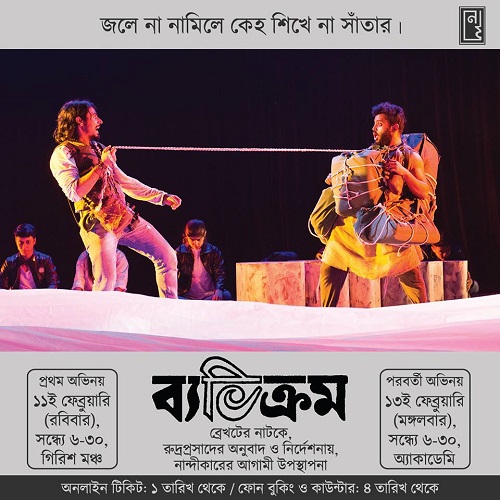
BYATIKRAM
Direction : Rudraprasad Sengupta
Synopsis :
It tells the story of a rich merchant, who must cross the fictional Yahi Desert to close an oil deal. During the trip the class differences between him and his working-class porter are shown. As he becomes increasingly afraid of the desert, the merchant's brutality increases, and he feels terribly alone without police nearby to protect him. Eventually when the Merchant fires his guide, the porter and the Merchant himself get lost and the water supplies are running low. The Merchant mistakenly shoots the coolie, thinking he was being attacked, when he was in reality being offered some water the coolie still had left in his bottle.
Later, in a court room scene, the evidence of the murder is presented. The evidence clearly suggests that the coolie never attempted to harm the merchant and the merchant killed the coolie. Will justice prevail?
Other Information :
Play: Bertolt Brecht
Translation and Direction: Rudraprasad Sengupta
Associate Director: Sohini Sengupta
Actors: Saptarshi, Arghya, Ayon, Somesh, Sumanta Ganguly and many others -
2017
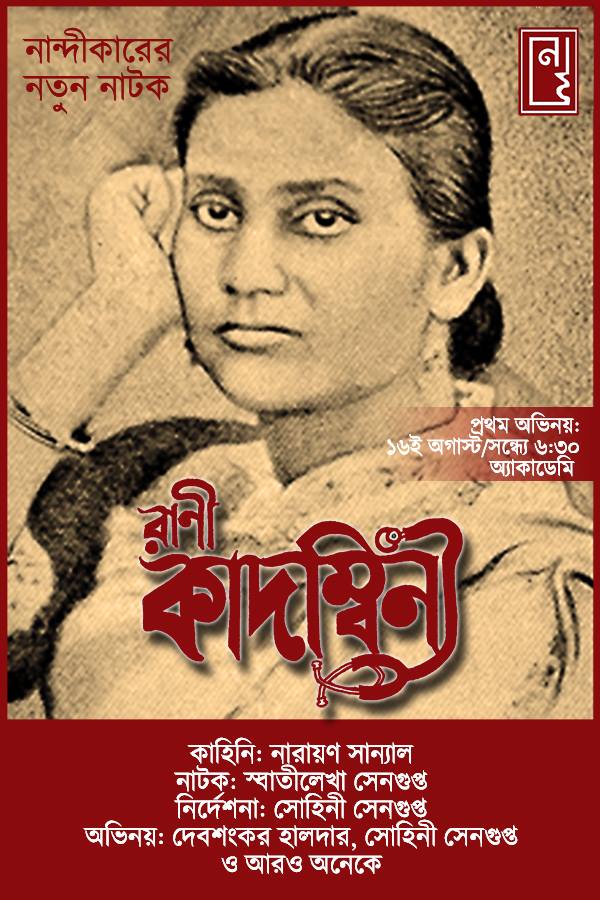
RANI KADAMBINI
Direction : Sohini Sengupta
Synopsis :
Back in the last decade of the nineteenth century, the Queen Mother of Nepal and the teenage daughter-in-law of a Lord in Calcutta are in similar agonies: they both are feeling terribly unwell. And neither of them can be examined by male doctors since it is against the existing social norms. They both would rather embrace, or be left to embrace, death. Enter Kadambini Ganguli, the first female doctor in the entire British Empire to have learnt and practised western medicine. She, of course, cures both women. And we embark on a journey through the life and times of Kadambini Ganguli.
Kadambini's father believes in women's emancipation and is always supportive of Kadambini's academic endeavours. Dwarakanath Ganguli, a very enthusiastic social worker, braves a hostile administration to help Kadambini get her much-deserved seat at the Medical College in Calcutta after Kadambini becomes one of the first two female graduates in India. However, not everyone is as supportive or even as accommodating. In an all-male Medical College, she is the centre of all uncalled-for attention. A particularly jealous professor stands between Kadambini and her graduation degree. But, with some help from Dwarakanath, she overcomes all adversaries and becomes the doctor she always wanted to be. Together, Dwaraka and 'Kadu', become one.
And, as we walk through the streets of an old, colonial Calcutta, hand-in-hand with one of the foremost harbingers of women's liberation of the nineteenth and the twentieth century, many questions arise. Can men and women be truly equal? Is the role of a successful woman limited to being the support system behind the success of a man? Can the roles here be reversed? Does women's liberation essentially mean ignoring the family or one's social responsibilities? Can successful working women also be successful homemakers?
The world, perhaps, would be a better place if we could find the answers and live up to them.Other Information :
Story: Narayan Sanyal
Play: Swatilekha Sengupta
Music: Swatilekha Sengupta/Mayukh-Mainak
Set: Ayon Ghosh/Debabrata Maity
Light: Sadhan Parui
Direction: Sohini Sengupta
Actors: Debsankar Halder, Sohini Sengupta, Saptarshi, Arghya, Ayon, Anindita and others.
Chief Adviser: Rudraprasad Sengupta
Premiere: 6:30pm on August 16, 2017 at Academy of Fine Arts, Kolkata -
2016
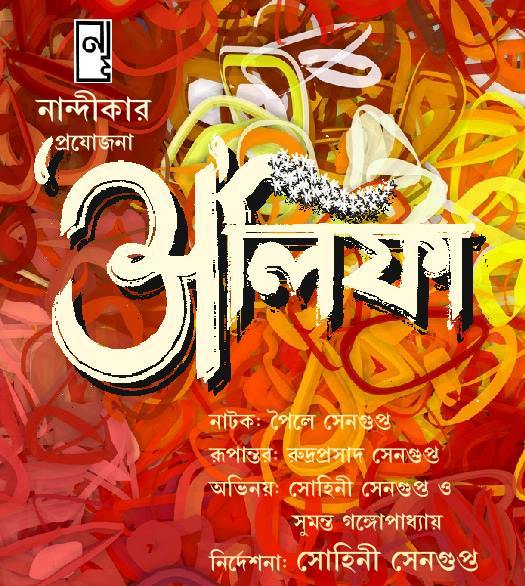
ALIPHA
Direction : Sohini Sengupta
Synopsis : The Woman grew up with her poor, single aunt who left no stone unturned to offer the Woman comfortable childhood. Many characters of her childhood still remain mysterious to her. The Man is the middle-aged misguided son of a powerful political leader. He grew up in luxury. His primary addictions are alcohol, women and power. Much of his life has been controlled by the selfish motives of his father and the son has engaged time and again, in exploitation and cruelty. Will the paths of the Woman and the Man ever cross? And if they do, what will it lead to?
Other Information :
CAST
Woman: Sohini Sengupta
Man: Sumanta Ganguly
CREDITS
Drama: Poile Sengupta
Adaptation : Rudraprasad Sengupta
Music : Swatilekha Sengupta
et : Debabrata Maity
Light: Arghya Dey Sarkar
Music Projection : Himangshu Paul/ Ayon Ghosh
Requisitions : Anindita Chakraborty
Production In Charge : Saptarshi Maulik and Ayon Ghosh
Costume & Direction : Sohini Sengupta
Duration of the play : 90 mins -
2016
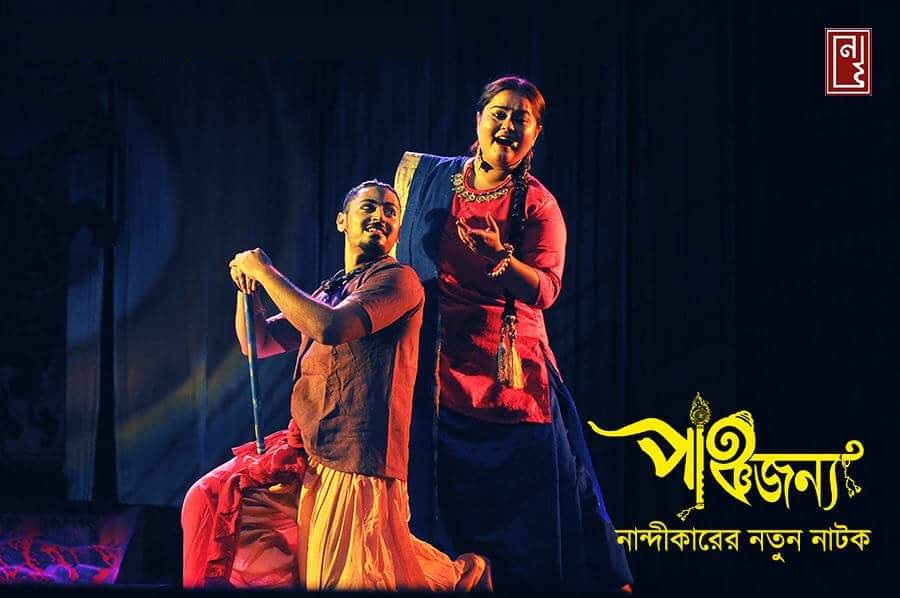
PANCHAJANYA
Direction : Sohini Sengupta
Synopsis : The Kurukshetra War has just ended. Gandhari, after losing her hundred sons, is a much-grieved lady. She holds Krishna responsible for her misery. Radha asks Krishna why, despite being the most powerful person in India, Krishna cannot confide in anyone. Krishna tells his side of the story. As the story unfolds we see how Krishna, the young shepherd boy, is always trusted by people around him to be their savior. How every time it is Krishna who has to take a strong - and sometimes not-pleasing-for-all - stand to ensure justice. How Krishna must sacrifice his personal life to establish the rule of Dharma. How Krishna merely becomes an instrument of justice. How destiny takes over his life. But can Krishna, who has been the symbol of love, allow destiny to take away all that is tender in him? Can commitment to state be greater than commitment to human values? How does a responsible man choose? Can a responsible man choose? Can war actually bring peace?
Other Information :
Cast & Credits
Jarasandha: Rudraprasad Sengupta
Gandhari: Swatilekha Sengupta
Old Krishna: Partha Pratim Deb
Radha-Draupadi-Rukmini: Sohini Sengupta
Kangsha: Sombhunath Shaw
Young Krishna: Saptarshi Maulik
Yashodha: Anindita Chakraborty
Shambo: Arghya Dey Sarkar
Balaram: Ayon Ghosh
Abhimanyu: Somesh Saha
Sandipani: Saayak Chakraborty/Sourav Dutta
Ayaan-Duryodhan: Suman Mitra
Gargo: Swajan Srijan Mukhopadhyay/Susanta Dutta
Arjun-Purut: Shubhadeep Roy
Chandrabati: Solanki Dev
Bishakha: Rupa Deb
Subhadra: Rakesh Das
Akrur: Abhrajit Banerjee
Sudama: Firoz Hazra
Chorus: Tithi Das, Sutosome Guha, Esa Das, Iman Banerjee, Pritam Kalyan Chakraborty, Malay Sarkar, Shreemanti Chatterjee, Shreya Bhattacharya, Oindrila Goswami, Biswajit Halder, Debapriya Mitra, Shweta Bagchi, Kuldeep Polley, Pronoy Mukhopadhyay
Lights: Sadhan Parui
Decor: Debabrata Maity
Music Design: Mayukh-Mainak
Sound Projection: Himangshu Pal
Choreography: Debkumar Pal
Co-choreographer: Shambhunath Shaw & Solanki Deb
Styling & Make-Up: Md. Ali, Malay Das & Nripen Chakraborty
Props-Requisites: Mithu Dey
Production In-Charge: Arghya Dey Sarkar and Ayon Ghosh
Chief Production Assistant: Anindita Chakraborty
Original Score & Co-direction: Parthapratim Deb
Chief Advisor: Rudraprasad Sengupta & Swatilekha Sengupta
Playwright: Parthapratim Deb
Costume Design & Direction: Sohini Sengupta
Duration: 2 hr. 20 min. -
2014

BIPANNATA
Direction : Sohini Sengupta
Synopsis : 'Bipanata' is a story of helplessness. Sulagna Dutta, a woman in her late 50s, is a widow and a single parent. She represents the common middle class, who wake up to everyday routine work and expect a more or less secured lifestyle. She is not a political bigwig, neither is she a \\\'celebrity\\\'. She is just like the thousands of Indian widowed working mothers you would not notice when they pass you by. She has singlehandedly raised her son Ujaan to be a good student and responsible son and he is now a computer engineer. The only problem is that he has an OPINION. His own well defined opinions. He is sensitive and reacts like a normal human being is supposed to react to events happening around him. Events of large scale state generated violence. Violence that permeates into our lives and induces a constant state of fear in our psyche. Sulagna is worried for her son, who goes into bouts of depression and hides at home, refusing to go out and participate in a world where he cannot question. So she has set up an appointment with the renowned psychoanalyst Dr. Ahana Roy. What follows is a heartrending search into fear psychosis and helplessness that is born out of it. Are we all trying to hide in our cocoons? Are we afraid to speak up, talk back, question? How is an individual supposed to negotiate in these circumstances? These times? Do we need help? Who can help?
Other Information :
CAST
Sulagna Dutta : Swatilekha Sengupta
Ahana Roy : Sohini Sengupta
Ujaan : Saptarshi Maulik
Sataroopa : Anindita Chakraborti
Assistant : Debabrata Maity
Old Man : Nripen Chakraborty
CREDITS
Drama : Debatosh Das
Set : Debabrata Maity
Lights : Arghya Dey Sarkar & Sadhan Parui
Music : Mayukh - Mainak
Sound : Himangshu Pal
Props-Requisites : Mithu Dey
Photography : Abhishek Nandy
Videography : Subrata Gharai - Biswajit Parua
Make-Up : Moloy Das - Nripen Chakraborty
Production In-Charge : Parthapratim Deb
Associates : Ayon Ghosh, Tithi Das, Shubhadeep Roy
Costume : Sohini Sengupta
Chief Advisor : Rudraprasad Sengupta -
2013

NAACHNI
Direction : Parthapratim Deb
Synopsis : To the Rasik Clan, 'Manbhoom' is the land of songs and dance. The novel 'Rasik' focuses on the lives of the Naachnis of Purulia. The harsh climate and difficult existence of Purulia blend with its soft melodies and reflect the lives of these musical people who have songs on their lips and pain in their hearts. The dry, stony arid lands wait for the rains, the wretched of the earth, who have almost no means of sustenance, live by the rich tradition of song (Jhumur) and dance (Naachni) that come naturally to their voices and bodies. The themes of 'Jhumur' gaan mainly draw upon the love tales of Radha and Krishna and give itself physical expression in 'Naachni' dance. The Naachnis or nautch girls might be excellent performing artists but are amongst the most marginalized sections of the society. They are women, they belong to Scheduled Castes and Tribes, they have no education or economic independence (their earnings being controlled by the male rasiks who earn by exploiting them), and are outcastes who are denied even their last rites. The play 'Naachni' which is structured from the novel 'Rasik' looks at the lives of these women. Bijolibala, a young girl is sold by her mother Rasanabala, an old and poverty-stricken Naachni, to a dacoit of Pagrokhatanga, Bharat Sardar. Bijoli is then rescued by her much married lover Pandavkumar and finds shelter in his house with Dhruvakumar, the older Rasik, and Kusmibai, his ageing Naachni and Pandava's wife Lata. Pandav loves Bijoli but also decides to take her on as his own Naachni and this is when the problem starts. Dhruvakumar is unable to accept this new competition and new generation of Rasiks and Naachnis and this leads them all especially Kusmibai to fatal consequences... This absorbing musical raises important questions about patriarchy and the position of women performing artists even in the 21st Century!
Other Information :
CAST
Dhrubakumar : Rudraprasad Sengupta
Kusmi Bai : Swatilekha Sengupta
Pandabkumar : Debsankar Halder
Bijulibala : Sohini Sengupta
Bheem Mahato : Sumanta Gangopadhyay
Rasanabala : Sharbani Bhattacharya
Jamuna : Rina Rana
Biraja : Anindita Chakraborty
Mayur : Debabrata Maity
Bankim : Arghya Dey Sarkar
Jathu : Susanta Dutta
Nighu : Rajendra Prasad Samanta
Lata : Iman Banerjee
Amala : Chandrani Chakraborty
Bharat Sardar : Saptarshi Maulick
Phonibala : Mithu Dey
Sarderni : Swarnali Majumdar
Lok 1 : Samrat Bose
Lok 2 : Sayak Chakraborty
Lomba : Swajan Srijan Mukhopadhyay
Bnete : Arghya Dey Sarkar
Prohlad Dom : Nripen Chakraborty
Musician :
Harmonium : Parthapratim Deb
Clarionet : Paritosh Natta
Percussion : Samrat Bose, Swajan Srijan Mukhopadhyay, Arghya Dey Sarkar
Chorus Arkadip Roy, Ayon Ghosh, Binita Bera, Esa Das, Puranjoy Das, Susakya Paul, Sayantani Tarafdar, Solanki Dev, Sourav Dutta,Somesh Saha,Suman Saha & Tanushree Chakraborti
CREDITS
Story : Subrata Mukhopadhyay
Lights : Joy Sen
Decor : Debabrata Maity
Props-Requisites : Mithu Dey
Music Recording : Mayukh-Mainak
Sound : Himangshu Pal
Make-Up : Malay Das & Nripen Chakraborty
Production In-Charge : Arghya Dey Sarkar, Anindita Chakraborty
Costume, Choreography & Associate Director : Sohini Sengupta
Drama, Music & Direction : Parthapratim Deb -
2012

NANA RANGER DIN
Direction : Rudraprasad Sengupta
Synopsis : Anton Chekhov's Swan Song is one of the finest short plays in theatre history. A Theatre House. The Show is long over. It is past midnight. Like a ghost appears athwart the dark stage an ageing actor, candle in hand, fully attired, sleepy, a little groggy. The actor playfully, somewhat sentimentally, retrospects his past and, in the bargain, offers us glimpses into his colourful life and glory of his acting career. This actor's voice sometimes cracks, he pants and puffs, he is afraid of his mortality and loss of talents. Yet, while departing, reciting Othello's famous farewell speech, gifts his Swan Song and proves he is an actor to the hilt.
Other Information :
CAST & CREDITS
Drama : Anton Chekov/ Ajitesh Bandyopadhyay
Music : Swatilekha Sengupta
Performers : Parthapratim Deb & Rudraprasad Sengupta
Direction : Rudraprasad Sengupta
Duration of Play : 35 Minutes -
2011

ANTO-AADI-ANTO
Direction : Debsankar Halder
Synopsis :
ANTO-AADI-ANTO has a simple storyline that begins during early night and ends in early dawn in the lobby of a plush hotel in Darjeeling. In the forenoon, the Court of Law has granted Anindita and Mrinmoy a formal divorce. In the late evening that very day, now legally separated, Mrinmoy and Anindita chance-meet in the lobby of the hotel where both of them have checked in.
No longer man and wife, they are now free individuals; but their past haunts them; they talk and talk as the grandfather clock strikes hour after hour.
Their departure, each to one’s destiny, is imminent, the moment of reckoning arrives– is it a moment of a new beginning or the beginning of an end!
Other Information :
CAST
Debsankar Halder, Sohini Sengupta
CREDITS
Drama : Marguerite Duras
Adaptation : Rudraprasad Sengupta
Music Concept : Swatilekha Sengupta
Music Implementation : Mayukh-Mainak
Lights : Joy Sen
Light-operation : Parthapratim Deb
Sets : Debabrata Maity
Make-up : Malay Das
Costume : Sohini Sengupta
Associates
Arghya Dey Sarkar, Himangshu Pal, Mithu Dey, Nilabha Chattopadhyay, Ram Shaw, Ranjan Chattopadhyay, Sudakshina Sarkar, Susanta Datta -
2010

KANU
Direction : Swatilekha Sengupta
Synopsis :
AUTHOR
KANU is a play - inspired by a Vietnamese short story 'A Manly Boy' (Kiem) by Ma Van Khang. However, Swatilekha Sengupta places this in our soil and imaginatively evolves an original Play.
SYNOPSIS
KANU is a play - inspired by a Vietnamese short story 'A Manly Boy' (Kiem) by Ma Van Khang. However, rooting this story in our own milieu and offering Kanu a free imaginative journey, Swatilekha Sengupta evolves an original Play. KANU, a boy of 12 or 13 summers, has a hen-pecked father, tyrannous step-mother, Kanu's mother has been turned out who presently is married to a truck driver, leading the life of a maid, wife, nurse, all combined in one, an existence of unending drudgery. Kanu loafs about often battered, oftener half-fed.
A neighbouring family, however, takes care of Kanu as far as possible. Kanu's journey continues. Ultimately, the narrative as well as all the characters find their still points, at peace with others and their own selves. The tale of KANU is simple and couched in the time-old mould of 'a boy's journey through poverty and penury', tyranny and trauma and of course, with the silver lining of 'goodness', ultimately prevailing. What salvages this play from its time-old melodramatic routine is a kind of 'ambivalence' in all the characters (black or white / goodies or baddies!) - from the protagonist Kanu to the faceless vengeful crowd - marked by an overt or covert sense of orphanage. We notice a subtle blending of the hunter and the hunted, the violent and the orphan, black or white, we notice a journey towards humanness. And this transformation happens through the catalyst-role of Kanu in all his relationships, in all his interfaces with the people in his small world.
THE RATIONALE : WHY KANU?
We notice that 'right of the Child to Childhood' is denied, and the global entertainment industry worth 1.8 trillion dollars has no use for the children other than using them as its baits. The situation is well summed up as :
stifling hierarchy at home and school, guardians mostly bully or pamper, other than 'mom' and 'dad' all are aliens or intruders, 'rank' or 'number' masquerade as knowledge' 'need' & 'greed' are synonyms 'sporting sprit' is out, 'killer instinct' in violence & sex-incitements endlessly supplied cartoon-violence is supplanted by 'ultimate fight' between two 'human beings' caged in a mesh for fight to finish the female child's role model is the 'super model' for the male child, it is the 'alpha male'!
Add to this situation, the future of our children and young which looks grim : no-supply or wrong supply of Sports, Unemployment and dubious self employment, Competitiveness, Consumerism, Lack of Centrality in the apathetic milieu all around. We remember the Latin American saying, 'WE DO NOT INHERIT THE EARTH FROM OUR ANCESTORS WE HAVE IT ON LOAN FROM OUR YOUNG ONES.'
This play KANU - if viewed in the context of the sweeping hostility enmeshing our young today - underlines a home truth that, come what may, the innate 'goodness' in every human being, particularly, in the young ones, can survive all odds our time needs to be ashamed of. This play, in short, very unassumingly, sans any adornment, reaffirms our faith in 'human goodness', - our hope in our own 'Young'!Other Information :
CREDITS
DECOR : SAUMIK/DEBABRATA MAITY
LIGHT : SADHAN PARUI
COSTUME : GOUTAM BASAK
SOUND : HIMANGSHU PAL
REQUISITES : ANINDITA CHAKRABORTY
MAKE-UP : MALAY DAS
PUBLICITY : MITHU DEY
OTHER ASSOCIATES : PARTHAPRATIM DEB, RAHUL HALDAR, SUDIP BANDYOPADHYAY, SWAJAN SRIJAN MUKHOPADHYAY, SAMRAT BOSE, RINA RANA, RAM SHAW & RUDRAPRASAD SENGUPTA
PRODUCTION CONTROLLER : SUSANTA DUTTA
CHOREOGRAPHY/ASSOCIATE DIRECTOR : SOHINI SENGUPTA
MUSIC-DRAMA-DIRECTION : SWATILEKHA SENGUPTA
PERFORMERS Sagardwip Deb, Solanki Dev, Saayak Chakraborty, Esa Das, Arghya Dey Sarkar, Samrat Bose, Anindita Chakraborty, Iman Banerjee, Tithi Das, Saptarshi Maulik, Ayon Ghosh, Sourav Dutta, omesh Saha, Shubhadeep Roy
DURATION
About 1 Hour and 30 Minutes -
2010

MADHABI
Direction : Swatilekha Sengupta
Synopsis : MADHABI - A play in Hindi by Bhisham Sahni
Adaptation into Bengali - Swatilekha Sengupta
This story from the Mahabharata is about Yayatis daughter Madhabi and her beloved Galab, a disciple of Rishi Vishwamitra. Internship completed, Galab insists on offering Guru Dakshina to Vishwamitra. Vishwamitra, keen to humble proud Galab, demands eight hundred Ashwamedha Horses. Galab is dumb-struck, he contemplates suicide, but divine intervention leads him to Yayatis hermitage. Yayati having abdicated his throne, now lives a humble life of an ascetic. As Galab arrives for help, Yayati has nothing to offer to him except his daughter Madhabi, endowed with boons of eternal virginity and the gift of begetting sons destined to be king of kings. Hence follows a great drama of Madhabi in quest of eight hundred Ashwamedha Horses. Galab is duty-bound to Guru Vishwamitra. Yayati is duty-bound to his dharma of Charity. Kings are keen to use Madhabi as surrogate mother of king of kings. And Madhabi? Madhabi is duty-bound to her father, her lover, but where has her love gone? What is her identity?
Why Madhabi?
A woman from the Mahabharata - is never dated. Epics abound with females cruelly sinned against : Sita, Draupadi, Iphigenia, Antigone and a countless legion. In our own liberated India shining, sati Roop Kanwar, gang-raped Hamida Banu, history-making Shah Bano, down to more recent Ruchika or Jessica Lal or Vaishnavi are endlessly newsworthy! In India - where 55% wives believe(!) that husbands have a right to beat, bruise, burn them - MADHABI represents innumerable women perpetually demeaned, desecrated, debauched, deflowered! But Madhabi is just not a feminist manifesto. Expectant in love, acquiescent in duties, subservient to hierarchy, Madhabi is a loser. World without batters her : but her freedom within - triggered by superhuman inhumanities meted out by all and sundry - transforms Madhabi the Agonistes into Madhabi the Triumphant. AND this ancient Madhabi provides us a lifes chance to discover the world-defying goodness we all have inside each of us!Other Information :
CAST
CHORUS LEADERS
Sumanta Gangopadhyay Rimi Mazumder Ayon Ghosh Solanki Dev
CHORUS
Anindita Chakraborty Arghya Dey Sarkar Ayon Ghosh Debabrata Maity Esa Das Goutam Basak Iman Banerjee Mithu Dey Parthapratim Deb Samrat Bose Saptarshi Maulik Sayak Chakraborty Solanki Dev Sourav Dutta Somesh Saha Susanta Dutta Suman Mitra Abhrajit Banerjee Tithi Das Srimanti Chatterjee Swajan Srijan Mukhopadhyay
LEAD SINGERS
Parthapratim Deb, Samrat Bose
CHARACTERS (as they appear)
Yayati : Rudraprasad Sengupta
Disciple Marich : Debabrata Maity
2nd Disciple : Ayon Ghosh
3rd Disciple : Goutam Basak
Galab : Debsankar Halder
Madhabi : Sohini Sengupta
King Haryashva : Parthapratim Deb
His Minister : Susanta Dutta
Court Astrologer : Shambhunath Shaw
Nurse : Mithu Dey
King Divadas : Swajan Srijan Mukhopadhyay
Courtier : Debabrata Maity
Bhrigus Messenger : Saayak Chakraborty
Viswamitra : Sumanta Gangopadhyay
Disciple : Susanta Dutta
King Ushinar : Shambhunath Shaw
Initiator : Samrat Basu
Tapas : Saptarshi Maulik
CREDITS
Drama : Bhisham Sahni
Adaptation : Swatilekha Sengupta
Decor & Dissemination : Saumik-Piyali
Props-Requisites : Mithu Dey
Lights : Susanta Mandal
Music : Swatilekha Sengupta, Mayukh-Mainak
Costume : Sohini Sengupta, Swatilekha Sengupta
Make-Up : Nripen Chakraborty and Malay Das
Wigs & Hair-do : Md Ali
Dance & Choreography : Sohini Sengupta
Associate Director : Sohini Sengupta
Director : Swatilekha Sengupta
Director's Note : This story of Madhabi attracted me because of its great drama, the tempestuous journey of a woman confronting a hierarchy which is steeped in moral pretence, demonic in its power-soaked status quo. Madhabi is a theatrical gold mine offering opportunity to explore theatre in its totality - its musicality, movement, visuality and endless charm of playing with a play within play! -
2008
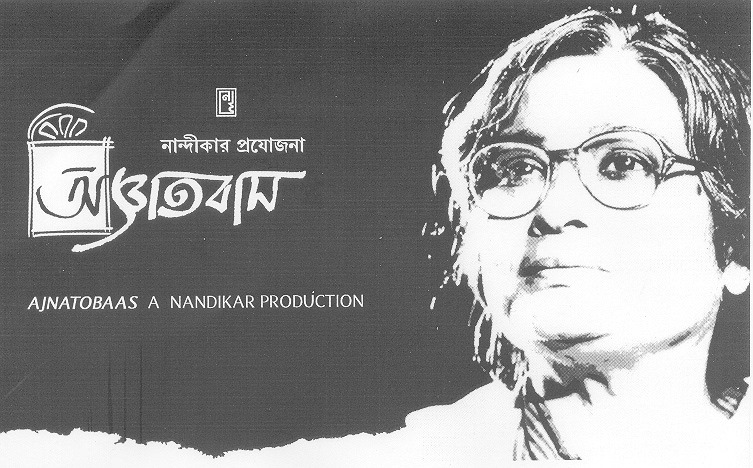
AJNATOBAAS
Direction : Sumanta Gangopadhyay
Synopsis :
How do men and women traverse the land called LIFE? Where do they come from and where do they go? That is the big question! Enters the scene a lady well past her middle-age, looking for a place to sit. Enters the scene Payel, a newly married woman, with a glass of water for the old lady and also looking for someone to talk to.Payel is, after all, lonely. Apprehensions and fears dominate the lives of Payel and husband Soumik, faced with peculiar situations involving the old lady. How does one handle a lady who remembers nothing of her past, yet is so alive, so fascinating. Or does she remember her past after all? Where will she go from here? Will Payel follow in her footsteps when she reaches the ladys age? Will all the Payels and the Soumiks do so?
Other Information :
CAST
Sumanta Gangopadhyay, Partha Pratim Deb/Swajan Srijan Mukherjee Rudraprasad Sengupta, Mithu Dey, Sohini Sengupta, Swatilekha Sengupta
CREDITS
Drama : Sukanta Gangopadhyay
Decor : Saumik &Piyali
Light : Susanta Mondal
Music Concept : Swatilekha Sengupta
Music Composition : Mayukh-Mainak
Sound Projection : Himangshu Pal
Make-up : Malay Das
Costume : Sohini Sengupta
Production Controller : Arghya Dey Sarkar
Directorial Adviser : Rudraprasad Sengupta -
2004

DULIA
Direction : Swatilekha Sengupta
Synopsis :
ABOUT THE PLAY
A play of pure delight, combining literary purity of Leela Mazumdar with a simple but extremely sophisticated narrative style of a Kathak in persona. Sohini Sengupta plays the elderly woman with a live musical chorus on stage.
SYNOPSIS/THE STORY
The story by the celebrated litterateur, Leela Mazumder, is almost a fable. A very elderly milkmaid is travelling from Doiwallah Station to Dulia Station. She is carrying on her head three shining brass-coated pitchers - one large, one small and one of middle size - all filled with fresh milk. She is taking these for her grandfather, her father, her husband and in-laws, her sons and her grandchildren. During the travel, when she meets a group of children, hungry yet endearing, she meets them all! It's a fabulous story about relatedness - an unadorned story about an udaarcharit who finds whole vasudha as her kutumbas!Other Information :
CAST
Sohini Sengupta with 4 accompanist musicians
CREDITS
Story : Leela Mazumdar
Set : Koushik Roychowdhury
Light : Susanta Mandal
Music : Swatilekha Sengupta
Directorial Adviser : Rudraprasad Sengupta
DURATION
30 minutes (No intermission) -
1993

PATA JHORE JAYE
Direction : Rudraprasad Sengupta
Synopsis :
ABOUT THE PLAY
This is a very touching play performed in the UK, USA and in major cities of our country. The theatrical simplicity and the literary quality of Buddhadeva Basu combine to create an arresting performance for both the elite and the commoner.
THE STORY/SYNOPSIS
Pata Jhore Jaye is a play by Buddhadeva Basu. The play is full of small chatter between a couple who have reached the fading years of life when one has to make peace with oneself. Their daughter and son are married. The daughter lives in America with her husband and a little son. The son lives in Delhi with his wife and daughter. The aged couple is living constantly in the hope that their children will visit them someday. They remember their bygone days, little happenings which have occurred in their lives - their sojourns on holidays, their care for each other, their disapproval for each other on so many occasions, their misunderstandings, memories happy and painful. The couple is on the verge of their journey to that land whence no traveller returns. And they are waiting for their children, love and death. An important aspect of this play is that while the two are reminiscing together, they are also talking almost to themselves, as though each is lost in his or her own world and time. The play is almost like a song - with the same images and dialogues recurring over and over again like musical refrains! It is the story of all individuals in their hope and aloneness.Other Information :
CAST & CREDITS
Play : Buddhadeva Bose
Music and Costume : Swatilekha Sengupta
Light : Manoj Prasad
Performers: Swatilekha Sengupta & Rudraprasad Sengupta
DURATION
About 45 minutes. (No intermission)
PREMIERED IN : July 3, 1993 at Los Angeles in the USA
Past Repertoire
Information will be updated soon.
